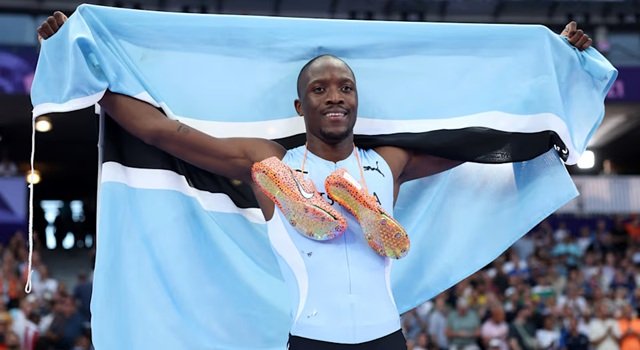Tebogo: ‘It Was Always My Goal to Break the Jamaican and American Sprint Dominance’
Almost a year after his stunning Olympic victory, Botswana’s Letsile Tebogo is making waves in the world of athletics. In a recent interview with Al Jazeera, the 21-year-old sprint sensation shared his deeper motivations behind his gold medal run in the men’s 200m at the 2024 Paris Olympics. “That’s always been my goal,” he said, reflecting on his desire to disrupt the long-standing American and Jamaican dominance in sprinting.
Tebogo’s triumph in Paris was nothing short of spectacular. He clocked an impressive 19.46 seconds, setting a new African record and personal best. This victory not only earned him the gold medal but also made him the first African athlete to win Olympic gold in the men’s 200m. Competing against a world-class field, including American Kenny Bednarek and reigning world champion Noah Lyles, Tebogo’s win was a historic moment that reshaped the narrative of Olympic sprinting.
For decades, the Olympic 200m has been a stage dominated by athletes from Jamaica and the United States. Since Donald Quarrie’s gold in 1976, the event has seen American legends like Carl Lewis and Michael Johnson, alongside Jamaican icons like Usain Bolt, who won three consecutive Olympic titles from 2008 to 2016. Only a handful of athletes from outside these two nations have managed to break through, making Tebogo’s victory even more significant.
While African athletes have excelled in middle- and long-distance events, sprinting success has been elusive. Tebogo attributes this gap to a lack of infrastructure and support for sprint development across the continent. “It’s mostly down to infrastructure and support,” he explained. “However, I can see that Africa is looking towards investing in its athletes beyond distance running.”
In Botswana, Tebogo’s win has sparked a shift in mindset among young athletes. “I’ve definitely seen athletes shed a layer of self-doubt,” he noted. “They are no longer afraid of coming forward to showcase their talent.” The hope is that the new government will step up to support these budding sprinters, paving the way for future champions.
Looking ahead, Tebogo dreams of a future where African sprinters dominate the global stage. “Africans are stepping up, and we see an increased number of African athletes in global competitions,” he said. His vision includes an all-African lineup at the Olympics, a dream that seems more attainable than ever.
With his remarkable speed and unwavering belief, Tebogo hasn’t just made history; he’s ignited a movement that could transform the landscape of sprinting. As the world watches, one can’t help but wonder: could this be the dawn of a new era in athletics, where African sprinters take their rightful place among the best?

